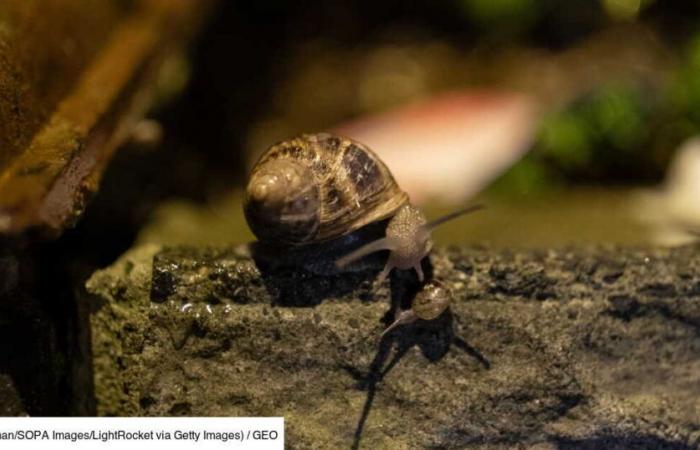“We thought they had disappeared forever, but today hope is reborn” : more than 1,300 snails from the Desertas Islands (Portugal), bred at Chester Zoo in the United Kingdom, have been reintroduced to their original habitat, the zoo announced on Saturday. These pea-sized snails belong to two different species, both “critically endangered”according to the International Union for Conservation of Nature (IUCN).
Native to the mountainous Deserta Grande Island (the largest island in the uninhabited Desertas Islands archipelago, southeast of Madeira), these tiny molluscs are threatened by habitat erosion, predation (especially from mice ), and drought.
Some surviving snails
But a series of conservation expeditions between 2012 and 2017 made it possible to set up a conservation program. It was the discovery of a small population of snails surviving on the rocky cliffs of the island of Deserta Grande that was decisive.
Of the 200 snails discovered by experts from the Madeira Institute for Nature Conservation and Forests (ICNF), around sixty were sent to Chester Zoo in the north of England. Food, vegetation… scientists have left nothing to chance to enable the reproduction of molluscs.
“When the snails arrived in Chester, the very future of the species was in our hands. It was a huge responsibility”remembered Gerardo Garcia from Chester Zoo, quoted in the press release. “We knew nothing about them. They had never been cared for by humans before and we had to start from scratch to try to understand what made them tick.”he continued.
-1329 snails reintroduced
Bristol Zoos, also in the United Kingdom, and Beauval Zoo, in France, have also participated in conservation efforts. A total of 1,329 snails bred at Chester Zoo were reintroduced to Bugio, one of the islands in the archipelago.
Identification points have been placed on all small molluscs. “This will allow us to spot them and monitor their growth and adaptation to their new environment”underlined Dinarte Teixeira, biologist at the Institute for the Conservation of Nature and Forests of Madeira, quoted in the press release. “We thought they had disappeared forever, but today hope is reborn” he said.
“All rights of reproduction and representation reserved. ©2025 Agence France-Presse. All information (text, photo, video, fixed or animated infographics, sound or multimedia content) reproduced on this page is protected by current legislation on intellectual property rights. Consequently, any reproduction, representation, modification, translation, commercial exploitation or reuse in any manner whatsoever is prohibited without the prior written consent of AFP, with the exception of personal non-commercial use. The AFP cannot be held responsible for delays, errors, omissions which cannot be excluded in the field of press information, nor for the consequences of actions or transactions carried out on the basis of this information. AFP and its logo are registered trademarks »
France






